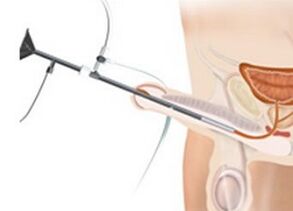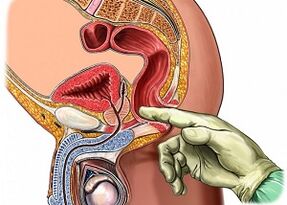Prostatitis is characterized by a complex inflammatory process in the prostate gland. The risk group consists of men 40 years of age and older who lead a sedentary lifestyle. The first symptoms occur in the acute form with purulent discharge of the urine, severe pain syndrome and a 40 degree rise in body temperature. Chronic prostatitis is no less dangerous than acute but shows a more hidden picture of development. Its danger lies in the irreversible disorders associated with the activity of sexual function.
Characteristics of the course of prostatitis
Signs of prostatitis begin to bother men due to malnutrition due to a sedentary lifestyle, hypothermia.
The course of the disease can be characterized by one of two forms:
- Acute prostatitis- determined by purulent discharge from the urine. Specific causes are associated with the pathogenic microflora. Treatment without antibiotics is ineffective.
- Chronic- develops as a result of improper or ineffective treatment. The signs are not as pronounced as in the acute course.
During remission, the symptoms of the pathology often disappear completely. Exacerbation of chronic prostatitis does not bother the patient as clearly as in the primary acute form. In most cases, the stagnant course of the disease is diagnosed as a consequence of a sedentary lifestyle in the background of chronic diseases due to low blood circulation in the pelvic organs.
The main signs of prostatitis are divided into three groups by doctors:
- disorders of the urinary system manifested by disorders of urinary excretion;
- enlarged sexual features of the enlarged prostate;
- development of neural pathologies.
Inflammation of the prostate triggers a decrease in the production of a special secret that supports sperm activity. They usually have less resistance to the harmful effects and the chances of successful fertilization of a female egg are close to the minimum.
According to medical statistics, the disease affects not only the elderly but also very young men. The risk group consists of the stronger sex from the age of 40. Physicians emphasize that the main emphasis should be on preventing the development of pelvic pathologies and preventive measures.
Symptom image
The symptoms of prostatitis are primarily pain syndrome. Unpleasant sensations in acute inflammation are characterized by a stinging, cutting, or sore character. They cause decreased performance, sleep disturbances. Enlargement of the prostate gland can be determined as early as the first stage from pelvic pain. In some patients, it develops during urination and defecation. During an erection and ejaculation, the sensations of pain increase.
As a result of the mechanical action on the walls of the urinary tract, pain is almost always accompanied by movement.
Urine flow problems interfere with almost all patients and in any form. Appears:
- false urination stimulus;
- Feeling of incomplete emptying of the bladder.
A person may need effort to urinate, and the beam is slow and intermittent. Acute inflammation causes frequent urination.
In addition to the listed symptoms of prostatitis, the acute development of the disease includes:
- muscle and joint pain;
- increase in body temperature to 40 degrees;
- fever, chills;
- feeling of swelling in the groin area;
- secretion from the urethra;
- burns and cramps when urinating;
- blood and pus streaks in the urine.
Complications of the chronic course of prostatitis can include male infertility, scarring and narrowing of the urethral tissues, complex kidney damage, sepsis. The testes, epididymis and canals become inflamed. The running course leads to pulverization of the prostate, which requires immediate surgery. Failure of surgical treatment requires occlusion of the bladder, which is associated with acute urinary retention.
Provocative Factors
The main causes of prostatitis can be summarized in the following list:
- Sexually transmitted infections. Trichomonas, mycoplasma, chlamydia, gonococcus, Escherichia coli, enterococcus can provoke changes in the tissues of the urethra and prostate.
- A sedentary and sedentary lifestyle contributes to the development of congestive and inflammatory processes in the pelvic organs.
- Disorders of lymphatic circulation and blood circulation.
- Continuous interruption or artificial augmentation of sexual intercourse, prolonged abstinence causes disturbances in prostate function.
- Regular mental stress, excessive physical exertion, stressful situations also affect men’s health and cause the development of prostatitis.
- Hypothermia, frequent colds and consequent decreased immunity are the cause of inflammatory processes in the reproductive organs.
- Hormonal disorders.
Management
Abnormal signs of acute or chronic prostatitis cannot be eliminated in a short time.
When selecting certain therapies, it is important to determine the type and form of the disease using diagnostic tests.
Medications

Antibiotics are indicated in the diagnosis of bacterial prostatitis. If the inflammatory process was not caused by an infection, there is no point in such therapy. The selection of a particular antibiotic is made by the attending physician after identifying the microorganism that causes the bacterial damage to the prostate gland.
In most cases, the medicine should be taken for at least 7 days. Alpha-blockers and antispasmodics help relieve pain syndrome. Systematic administration of this class of drugs helps to relax the muscles of the bladder and prostate. This improves urine flow and reduces the overall clinical picture.
Intravenous fluids and diuretics appear in men with particularly severe pathology. This improves urine flow. In addition, it can stop the body from poisoning in this way.
Non-bacterial prostatitis is treated with antipyretic, analgesic, anticholinergic agents. In case of constipation, laxatives and suppositories based on Vaseline oil should be used.
Supportive care
An additional step to medication is:
- bed rest;
- complete rest;
- drink plenty of fluids, at least 2 liters a day;
- sitting in hot baths.
Transient suprapubic fistula is prescribed for acute urinary retention. An alternative approach is regular bladder catheterization. Doctors will only prescribe such treatment if the medication is ineffective. Patients should not forget about the contraindications to body hypothermia during treatment, cycling, and prolonged sessions on hard surfaces.

Prostate massage is prescribed from the first days of prostate diagnosis. This method helps relieve the pressure of the enlarged gland in the urethra, thereby improving the urination process and reducing induration.
Adherence to a diet that excludes spicy and fatty foods, as well as alcoholic and carbonated beverages, allows you to normalize your overall well-being.
Surgery
In cases where drug therapy has failed to treat prostatitis, surgery is needed. In exceptional cases, in the case of stagnant flow, the flow of urine is blocked. Surgical treatment is also essential here. The contraindication to surgery is the patient's reproductive age. In young men, surgery can lead to infertility.
Transurethral resection of the prostate is a surgical excision of all inflamed tissue. Prostatectomy is performed to completely remove the prostate, adjacent tissues, and nuclei. The negative consequences of such an intervention are urinary incontinence and impotence. This type of medical care is necessary because of the malignant nature of the pathology. This allows you to get rid of the inflammatory process of the prostate gland once and for all.
Prostatitis is considered a complex and insidious disease with chronic remission in chronic form. It is not always possible to completely cure it, so it is the responsibility of every doctor to eliminate the main symptoms. How long it will take for their total disappearance is impossible to determine exactly. In most situations, urologists make reassuring predictions.
Alternative therapy
Not only medical methods but also folk remedies are used to treat the disease.
The uterus is dead
Make an alcohol tincture from 2 teaspoons. podmore and 200 ml of alcohol or vodka. 3 times a day, on an empty stomach, 40-60 drops, depending on the patient's weight. Course therapy - 25 days. The composition of the uterine worm contains unique ingredients that have a therapeutic effect on the problems of the male reproductive system.
broth with the addition of 2 tsp. honey, 1 teaspoon. podmora 1 cup boiling water over low heat for 10 minutes. The treatment should then be adhered to for about 3-4 hours. Use 2 tbsp. l. twice daily before meals. The optimal treatment time with this treatment is 1 month. You should then take a break for 7-10 days and if there is no improvement, continue therapy.
Pumpkin Seeds
Pumpkin seeds must be ground in a coffee grinder before use. Take 2 tablespoons daily on an empty stomach. l. , wash with a glass of water diluted with 2 tsp. natural honey.
You can add a few drops of fresh parsley juice to the honey.
Chestnuts
Mix the raw materials in equal proportions (10 g each):
- dried licorice roots;
- berry, chestnut, lump and castor oil plant leaves.
You can add 15 g of dandelions, pies, beans to enhance the effect. Make 1 tablespoon of fresh decoction every day. l. mixed plant ingredients and 0, 5 liters of water. Bring to a boil for 10 minutes, then leave for another half hour. Drink 4 servings just before meals. The course is 30 days long.
Prevention
The manifestation of symptoms in the clinical picture of prostatitis contributes to the formation of inferiority complexes. This causes stressful situations and depressed moods in men. Many patients are characterized by irritability and a tendency to conflict. Aggressive behavior interferes with normal communication.
In most cases, you should seek the help of an experienced psychologist. After all, sexual disorders have a very negative effect not only on a man’s mood, but on his entire life. Therefore, psychological rehabilitation is no less important than drug therapy.
Doctors recommend avoiding hypothermia and excessive physical exertion. An effective tool for preventing prostatitis is an active sex life with a permanent partner. Prolonged abstinence, deficient ejaculation are contraindicated. It is necessary to limit the use of alcoholic beverages from the age of 40 and to stop smoking. The main focus should be on moderate exercise and vitamin therapy.
































